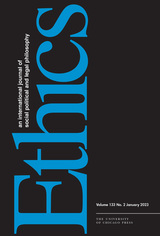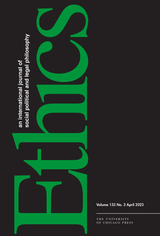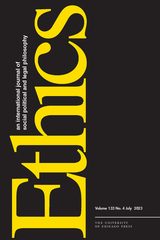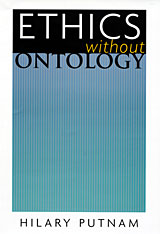114 start with E start with E








In this brief book one of the most distinguished living American philosophers takes up the question of whether ethical judgments can properly be considered objective—a question that has vexed philosophers over the past century. Looking at the efforts of philosophers from the Enlightenment through the twentieth century, Hilary Putnam traces the ways in which ethical problems arise in a historical context.
Putnam’s central concern is ontology—indeed, the very idea of ontology as the division of philosophy concerned with what (ultimately) exists. Reviewing what he deems the disastrous consequences of ontology’s influence on analytic philosophy—in particular, the contortions it imposes upon debates about the objective of ethical judgments—Putnam proposes abandoning the very idea of ontology. He argues persuasively that the attempt to provide an ontological explanation of the objectivity of either mathematics or ethics is, in fact, an attempt to provide justifications that are extraneous to mathematics and ethics—and is thus deeply misguided.

What might we learn if the study of ethics focused less on hard cases and more on the practices of everyday life? In Everyday Ethics, Michael Lamb and Brian Williams gather some of the world’s leading scholars and practitioners of moral theology (including some GUP authors) to explore that question in dialogue with anthropology and the social sciences. Inspired by the work of Michael Banner, these scholars cross disciplinary boundaries to analyze the ethics of ordinary practices—from eating, learning, and loving thy neighbor to borrowing and spending, using technology, and working in a flexible economy. Along the way, they consider the moral and methodological questions that emerge from this interdisciplinary dialogue and assess the implications for the future of moral theology.

In this book, Stephen J. Pope argues that contemporary scientifically-based theories of the evolution of altruism provide important insights into one of the fundamental moral problems of Christian ethics, the natural basis of love and its ordering. He explores the contributions evolutionary theory makes to our understanding of the biological foundations of kin preference and reciprocal care, the limits of love, and the need for an ordering of love—issues relevant to any ethic that accords a central role to the deeply natural affections found in friendship, marriage, and the family. He proposes that understanding human nature in its broader evolutionary context brings to ethics a needed balance between the personal and biological dimensions of human nature.
In the context of Catholic ethics, Pope points out functional similarities between Thomas Aquinas's use of then-available scientific theories in his interpretation of the natural basis of primary relationships and Pope's own efforts to avoid the deficiencies that characterize contemporary Catholic interpretations of love based on personalism and existentialism. He concludes with a call for a multidimensional interpretation of love, one that incorporates scientifically-based theories about human nature together with an appreciation of the significance of motives, intentions, and freedom, for the ordering of human affections and moral responsibility. This book will be of interest to moral theologians, especially those concerned with the topics of love, justice, and natural law ethics.

The Experiment Must Continue is a beautifully articulated ethnographic history of medical experimentation in East Africa from 1940 through 2014. In it, Melissa Graboyes combines her training in public health and in history to treat her subject with the dual sensitivities of a medical ethicist and a fine historian. She breathes life into the fascinating histories of research on human subjects, elucidating the hopes of the interventionists and the experiences of the putative beneficiaries.
Historical case studies highlight failed attempts to eliminate tropical diseases, while modern examples delve into ongoing malaria and HIV/AIDS research. Collectively, these show how East Africans have perceived research differently than researchers do and that the active participation of subjects led to the creation of a hybrid ethical form.
By writing an ethnography of the past and a history of the present, Graboyes casts medical experimentation in a new light, and makes the resounding case that we must readjust our dominant ideas of consent, participation, and exploitation. With global implications, this lively book is as relevant for scholars as it is for anyone invested in the place of medicine in society.

In the past few decades, scientists of human nature—including experimental and cognitive psychologists, neuroscientists, evolutionary theorists, and behavioral economists—have explored the way we arrive at moral judgments. They have called into question commonplaces about character and offered troubling explanations for various moral intuitions. Research like this may help explain what, in fact, we do and feel. But can it tell us what we ought to do or feel? In Experiments in Ethics, the philosopher Kwame Anthony Appiah explores how the new empirical moral psychology relates to the age-old project of philosophical ethics.
Some moral theorists hold that the realm of morality must be autonomous of the sciences; others maintain that science undermines the authority of moral reasons. Appiah elaborates a vision of naturalism that resists both temptations. He traces an intellectual genealogy of the burgeoning discipline of "experimental philosophy," provides a balanced, lucid account of the work being done in this controversial and increasingly influential field, and offers a fresh way of thinking about ethics in the classical tradition.
Appiah urges that the relation between empirical research and morality, now so often antagonistic, should be seen in terms of dialogue, not contest. And he shows how experimental philosophy, far from being something new, is actually as old as philosophy itself. Beyond illuminating debates about the connection between psychology and ethics, intuition and theory, his book helps us to rethink the very nature of the philosophical enterprise.


A sharp exposé of the roots of the cost-exposure consensus in American health care that shows how the next wave of reform can secure real access and efficiency.
The toxic battle over how to reshape American health care has overshadowed the underlying bipartisan agreement that health insurance coverage should be incomplete. Both Democrats and Republicans expect patients to bear a substantial portion of health care costs through deductibles, copayments, and coinsurance. In theory this strategy empowers patients to make cost-benefit tradeoffs, encourages thrift and efficiency in a system rife with waste, and defends against the moral hazard that can arise from insurance. But in fact, as Christopher T. Robertson reveals, this cost-exposure consensus keeps people from valuable care, causes widespread anxiety, and drives many patients and their families into bankruptcy and foreclosure.
Marshalling a decade of research, Exposed offers an alternative framework that takes us back to the core purpose of insurance: pooling resources to provide individuals access to care that would otherwise be unaffordable. Robertson shows how the cost-exposure consensus has changed the meaning and experience of health care and exchanged one form of moral hazard for another. He also provides avenues of reform. If cost exposure remains a primary strategy, physicians, hospitals, and other providers must be held legally responsible for communicating those costs to patients, and insurance companies should scale cost exposure to individuals’ ability to pay.
New and more promising models are on the horizon, if only we would let go our misguided embrace of incomplete insurance.
READERS
Browse our collection.
PUBLISHERS
See BiblioVault's publisher services.
STUDENT SERVICES
Files for college accessibility offices.
UChicago Accessibility Resources
home | accessibility | search | about | contact us
BiblioVault ® 2001 - 2024
The University of Chicago Press









